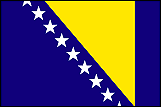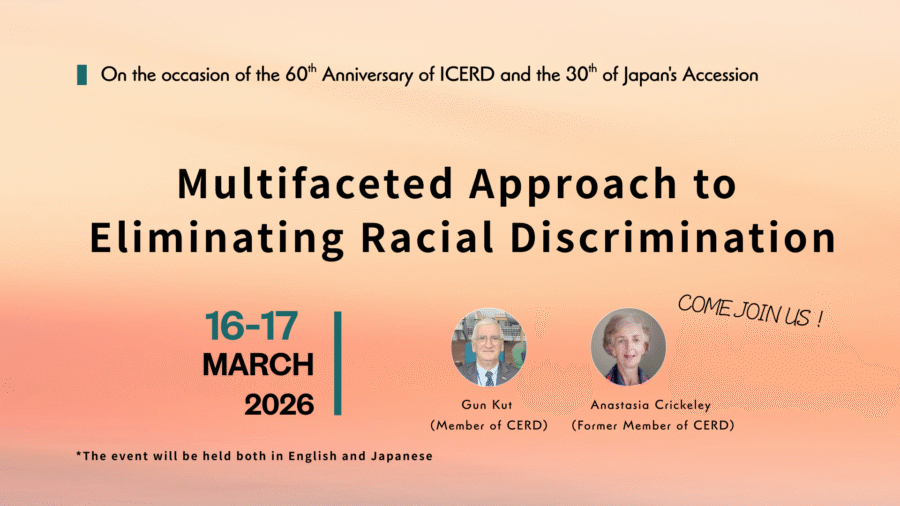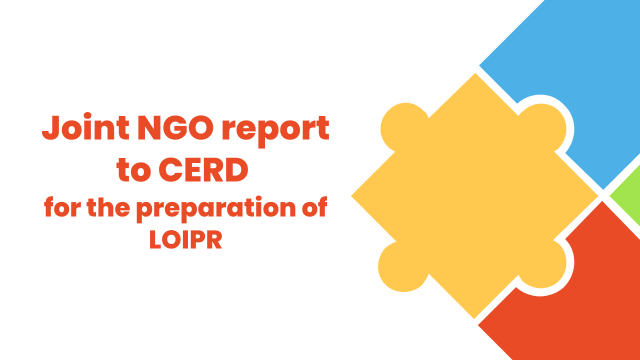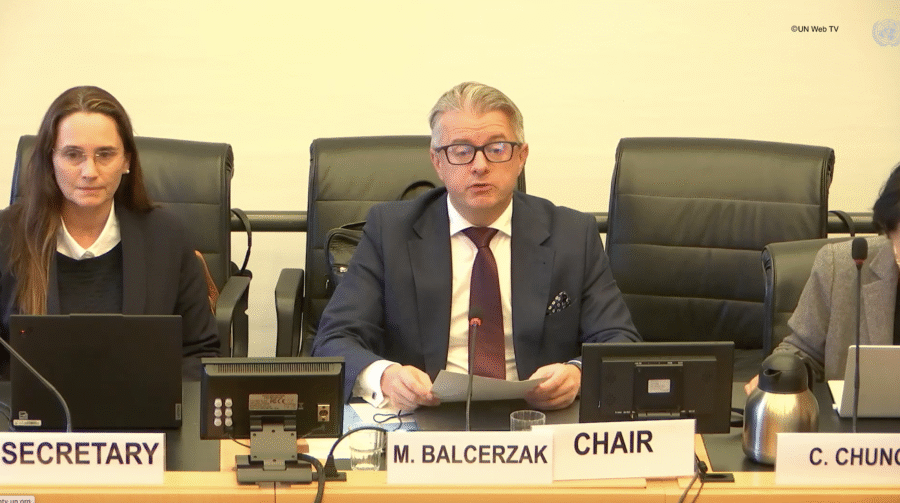CERD adopted concluding observations of France, Guatemala, Bosnia and Herzegovina, Sudan, Germany and Denmark (15 May 2015)
May 15, 2015
On the last day of the 86th session, the UN Committee on the Elimination of Racial Discrimination (CERD) adopted the concluding observations of France, Guatemala, Bosnia and Herzegovina, Sudan, Germany and Denmark. *Recommendations with asterisks [*] are follow-up recommendations
Concluding observations, reports of the State parties and other stakeholders are available at the OHCHR website ![]() . You can also watch the public meetings with State parties at UN Treaty Body Webcast
. You can also watch the public meetings with State parties at UN Treaty Body Webcast ![]() .
.
France
 The Committee expressed concern on prevailing hate speech including in the internet. Discrimination against Muslims and the treatment of Roma and travellers were concerned. Violations of indigenous peoples’ rights in oversea territories, such as New Caledonia and French Guyana, were inquired during the meeting which included the rights to self-determination, lands and traditional practices. The situation of migrants, refugees and asylum seekers was also questioned. The Committee emphasised the need of disaggregated statistical data. The Committee welcomed the National Action Plan against Racism and Anti-Semitism 2015-2017. Read more (English/ French)
The Committee expressed concern on prevailing hate speech including in the internet. Discrimination against Muslims and the treatment of Roma and travellers were concerned. Violations of indigenous peoples’ rights in oversea territories, such as New Caledonia and French Guyana, were inquired during the meeting which included the rights to self-determination, lands and traditional practices. The situation of migrants, refugees and asylum seekers was also questioned. The Committee emphasised the need of disaggregated statistical data. The Committee welcomed the National Action Plan against Racism and Anti-Semitism 2015-2017. Read more (English/ French) ![]() . In concluding observations
. In concluding observations ![]() , the Committee issued recommendations concerning following areas:
, the Committee issued recommendations concerning following areas:
- Application of the Convention at the local level*;
- Demographic composition of the population;
- National Action Plan against Racism and Anti-Semitism;
- Racial hate crime;
- Racist hate speech and incitement to racial hatred including on the internet;
- Discrimination against Roma;
- Travellers;
- Minorities, indigenous peoples, people of African descents and overseas communities*;
- Indigenous peoples of Guyana;
- Indigenous peoples of New Caledonia;
- Situation in Mayotte;
- Situation of people living in the suburbs, including people of foreign origin and non-citizens;
- Asylum seekers and refugees, including unaccompanied minors; and
- Human rights and terrorism*
Guatemala
 The Committee raised various issues concerning indigenous peoples, including the State security personnel’s persistent use of force against the communities and attacks against human rights defenders. The Committee highlighted the lack of prior consultations with indigenous communities for projects which potentially impact their natural resources. Low level of political participation of indigenous peoples in comparison to their population was identified as one of the causes for structural inequality. Inadequate law to protect indigenous lands and recognise traditional justice system was addressed in the meeting. The Committee also emphasised the need to ensure the independence of judiciary. Read more (English)
The Committee raised various issues concerning indigenous peoples, including the State security personnel’s persistent use of force against the communities and attacks against human rights defenders. The Committee highlighted the lack of prior consultations with indigenous communities for projects which potentially impact their natural resources. Low level of political participation of indigenous peoples in comparison to their population was identified as one of the causes for structural inequality. Inadequate law to protect indigenous lands and recognise traditional justice system was addressed in the meeting. The Committee also emphasised the need to ensure the independence of judiciary. Read more (English) ![]() . In concluding observations
. In concluding observations ![]() , the Committee issued recommendations concerning following areas:
, the Committee issued recommendations concerning following areas:
- Statistical data*;
- Legal framework*;
- Impunity;
- Free, prior and informed consultation;
- Human rights defenders;
- Political participation*;
- Access to justice and legal pluralism;
- Criminalisation of racial discrimination;
- Structural discrimination;
- Intercultural health;
- Bilingual education;
- Labour rights;
- Media;
- Strengthening institutions; and
- Multiple discrimination
Bosnia and Herzegovina
 While welcoming various State measures to combat racial discrimination, the Committee was concerned by the incompatibility of the Constitution with the Convention on the treatment of ethnic minorities. The Committee expressed interest in the implementation of the decision of the European Court of Human Rights on the Sejdić-Finci case. The Committee questioned the methodology of the 2013 national population census for the collection of precise disaggregated statistical data. The need for effective measures to support the return of refugees and internally displaced persons was also highlighted. The Committee expressed concern on continuous discrimination against Roma including in education and housing. Read more (English)
While welcoming various State measures to combat racial discrimination, the Committee was concerned by the incompatibility of the Constitution with the Convention on the treatment of ethnic minorities. The Committee expressed interest in the implementation of the decision of the European Court of Human Rights on the Sejdić-Finci case. The Committee questioned the methodology of the 2013 national population census for the collection of precise disaggregated statistical data. The need for effective measures to support the return of refugees and internally displaced persons was also highlighted. The Committee expressed concern on continuous discrimination against Roma including in education and housing. Read more (English) ![]() . In concluding observations
. In concluding observations ![]() , the Committee issued recommendations concerning following areas:
, the Committee issued recommendations concerning following areas:
- Situation of returnees including minority returnees and Roma IDPs;
- Institution of Human Rights Ombudsman*;
- Socioeconomic situation of Roma;
- Awareness of the prohibition of racial discrimination*;
- Citizenship law;
- Segregation in education;
- Hate speech and hate crimes*; and
- Treatment of asylum-seekers, refugees and persons granted subsidiary protection
Sudan
 Although the Committee welcomed the establishment of the National Human Rights Institution, its independence remained questionable. Ethnic tensions in Darfur, South Kordofan and the Blue Nile were concerned by the Committee. Immunity of certain state officials such as the National Security Agency and the judiciary was also concerned. The situation of ethnic minorities including the Dinka people and the people in the Nuba mountain was inquired. The Committee raised the issues of internally displaced persons, religious minority and complaint mechanisms for victims of racial discrimination. Crackdown on civil society remained a concern of the Committee. Read more (English)
Although the Committee welcomed the establishment of the National Human Rights Institution, its independence remained questionable. Ethnic tensions in Darfur, South Kordofan and the Blue Nile were concerned by the Committee. Immunity of certain state officials such as the National Security Agency and the judiciary was also concerned. The situation of ethnic minorities including the Dinka people and the people in the Nuba mountain was inquired. The Committee raised the issues of internally displaced persons, religious minority and complaint mechanisms for victims of racial discrimination. Crackdown on civil society remained a concern of the Committee. Read more (English) ![]() . In concluding observations
. In concluding observations ![]() , the Committee issued recommendations concerning following areas:
, the Committee issued recommendations concerning following areas:
- Inter-ethnic relations within Sudan; On-going conflict in Darfur;
- Security escalation in South Kordofan and Blue Nile states;
- Political status of Abyei;
- Internal displacement*;
- Sexual violence in conflict areas;
- Definition of racial discrimination and anti-discrimination legislation;
- Freedom of expression and excessive use of force by law enforcement officials;
- Relevant statistical data;
- Status of the Convention in domestic legal order;
- Independence of the judiciary;
- National human rights institution;
- Representation of minority groups in political life;
- Citizenship and risk of statelessness*;
- Security of refugees and asylum seekers*;
- Nubian peoples’ right to land;
- Complaints mechanism; and
- National action plan to combat racial discrimination
Germany
 The Committee highlighted the narrow definition of racism and racial discrimination in the German law. Racism in election campaigns was urged to be tackled. The Committee expressed concern on activities of racist groups and increasing hate speech. The inclusion and protection measures for refugees and asylum seekers were inquired. The Committee was concerned by prevailing discrimination against Sinti and Roma. The Committee acknowledged discrimination experienced by citizens with migration background as well as LGBTQI persons belonging to minority groups, including in employment and education. The Committee recognised racial profiling by police as discriminatory. Read more (English)
The Committee highlighted the narrow definition of racism and racial discrimination in the German law. Racism in election campaigns was urged to be tackled. The Committee expressed concern on activities of racist groups and increasing hate speech. The inclusion and protection measures for refugees and asylum seekers were inquired. The Committee was concerned by prevailing discrimination against Sinti and Roma. The Committee acknowledged discrimination experienced by citizens with migration background as well as LGBTQI persons belonging to minority groups, including in employment and education. The Committee recognised racial profiling by police as discriminatory. Read more (English) ![]() . In concluding observations
. In concluding observations ![]() , the Committee issued recommendations concerning following areas:
, the Committee issued recommendations concerning following areas:
- Lack of disaggregated data on the composition of the population;
- Definition of racial discrimination and applicability of the Convention at the national level;
- Lack of comprehensive anti-discrimination legislation;
- Hate speech and incitement to racial discrimination;
- Institutional shortcomings in investigating racially motivated acts*;
- Racial profiling and other racially discriminatory acts committed by law enforcement officials;
- Discrimination and segregation in housing;
- Education;
- Employment;
- Inter-sectional discrimination including based on gender, religion and sexual orientation;
- Sinti and Roma; and
- Asylum seekers and “tolerated” migrants
*Individual communications: TBB-Turkish Union in Berlin/Brandenburg v. Germany (“Sarrazin case”)
Denmark
 The Committee welcomed the establishment of the anti-discrimination unit and National Action Plan against Racism. Non-incorporation of the ICERD into the domestic law, lack of application of the Convention in domestic courts and low level of prosecution of hate crime were raised as concerns. The status of the Convention and anti-discrimination measures in Greenland and the Faroe Islands were inquired. The Committee emphasised the need for effective measures to combat hate speech both offline and online. The situations of Roma, indigenous peoples, refugees and migrants were also addressed. Read more (English)
The Committee welcomed the establishment of the anti-discrimination unit and National Action Plan against Racism. Non-incorporation of the ICERD into the domestic law, lack of application of the Convention in domestic courts and low level of prosecution of hate crime were raised as concerns. The status of the Convention and anti-discrimination measures in Greenland and the Faroe Islands were inquired. The Committee emphasised the need for effective measures to combat hate speech both offline and online. The situations of Roma, indigenous peoples, refugees and migrants were also addressed. Read more (English) ![]() . In concluding observations
. In concluding observations ![]() , the Committee issued recommendations concerning following areas:
, the Committee issued recommendations concerning following areas:
- Monitoring racial discrimination;
- The Convention in domestic legislation;
- Enforcement of provisions on racial discrimination;
- Racist discourse and incidents*;
- Family Reunification;
- Refugees;
- Adequate housing;
- Education;
- Employment*;
- Victims of domestic violence;
- Right to remedies;
- Ethnic minorities in the police and in the administration of justice;
- Greenland and Faroe Islands;
- Structural discrimination;
- Indigenous peoples; and
- Awareness-raising





